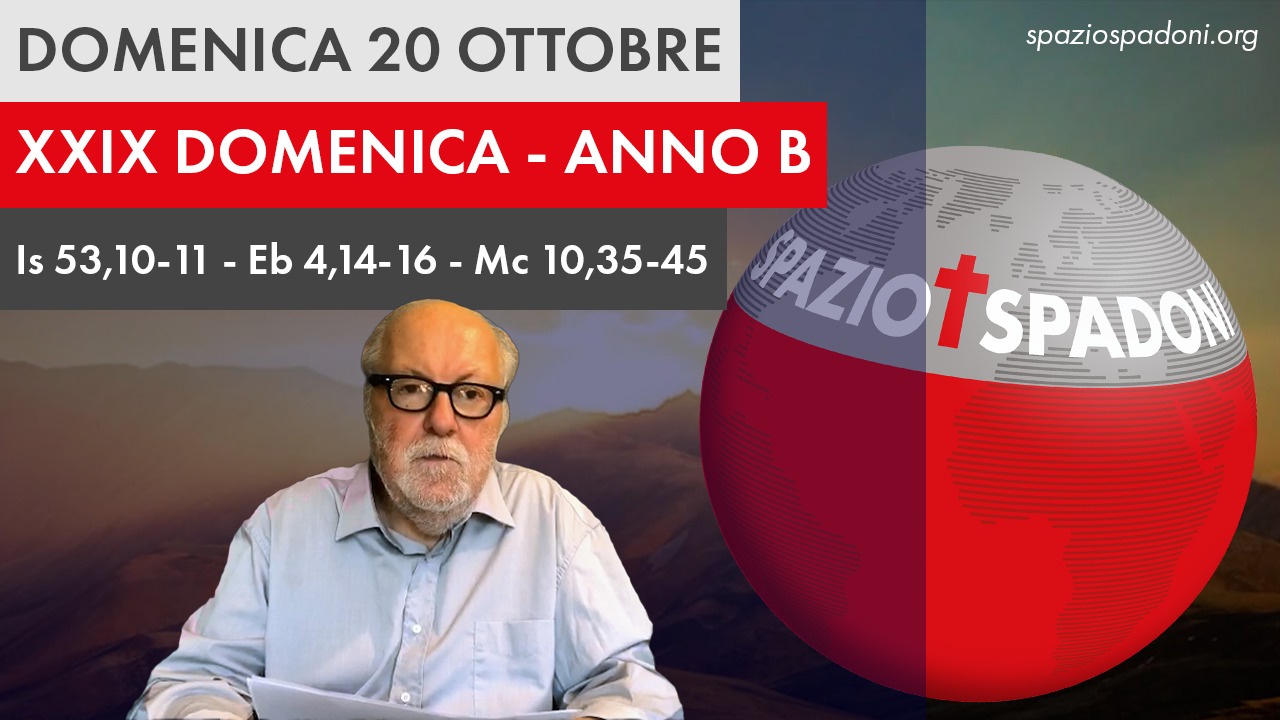
Sunday XXIX Year B – Called To Martyrdom
Readings: Is 53:2,3,10-11; Heb 4:14-16; Mk 10:35-45
Today’s liturgy proposes to us the basic choice of our Christian life: serving or serving oneself, humiliation or glory, martyrdom or power. The choice is between drinking the same cup as Christ, undergoing his own baptism (Mk 10:39), or sitting on thrones like the leaders of the nations (Mk 10:37, 42). We are not called to possess, but to give; we are not called to dominion, but to martyrdom, to witnessing (in Greek “martury”) to the point of giving of ourselves.
For we are the disciples of the “Servant of the Lord,” of whom the First Reading tells us, “despised and reviled by men, a man of sorrows who knows well the affliction” (Is 53:2, 3, 10-11), and as the Second Reading states (Heb 4:14-16), “having been himself tried in all things.”
We must forcefully meditate again on our vocation to be martyrs. Martyrdom is no longer a phenomenon of other ages, or relegated to some lost mission country. Today one in seven Christians + persecuted. From Timor to Algeria, from El Salvador to the former Yugoslavia, from Sudan to China, from Rwanda to Burma, so many believers increasingly are called to witness to the end to their fidelity to Christ. Martyrdom is again at the heart of the Church: and it is a true sign of ecumenism that Christians of different denominations find themselves united in it. Pope Francis said, “Martyrs are more numerous in our time than in the first centuries. Today there are so many martyrs in the Church, so many, because in order to confess the Christian faith they are thrown out of society or go to prison.”
Martyrdom is a call for all, in different ways and forms, but one that must find us ready. Wrote Brother Christian, the prior of the seven monks killed in 1996 in Algeria, “Insecurity? It is a grace of faith…. Best suited for vigilance: ‘Watch, for you do not know….’ Christ was asked to choose between two stabilities: the throne or the cross. Christ chose the cross: he made it his throne, the footstool of his kingdom. Unfortunately, often throughout history the church has often preferred the throne. Especially after the edict of Constantine….” Proclaimed Msgr. Pierre Claverie, bishop of Oran, in a homily some 40 days before he was killed in 1996, “I have often been asked, ‘What are you doing over there? Why are you staying?” We are there because of this crucified Messiah…. We have no interests to safeguard nor influences to preserve. Nor are we driven by who knows what masochistic or suicidal perversion…. Is it not essential for a Christian to be there, in the places of suffering, of abandonment? Where could the church of Jesus Christ possibly be if it were not first and foremost there? Paradoxical as it may seem, the strength, the vitality, the hope, the fruitfulness of the church comes from there. Not from elsewhere or otherwise. Everything else is just smoke in the eyes, worldly illusion. The church deceives itself and the world when it positions itself as a power among others, as an organization, albeit a humanitarian one, or as a spectacular evangelical movement. It may shine, but it does not burn with God’s love, “strong as death” (Ct. 8:6). In fact, it is precisely about love, first and foremost, and only about love. A passion of which Jesus gave us the taste and traced the path: ‘There is no greater love than to lay down one’s life for one’s friends’ (Jn. 15:13).”
Martyrdom is a call for everyone, in different ways and forms, but one that must find us ready. And it is not just being killed for proclaiming our faith. It is martyrdom to be mocked for being a believer, not to have a career because one refuses to compromise; it is the renunciation of abortion by a girl-mother, it is accepting a motherhood that is the result of violence, or refusing for oneself even important treatments that could harm the gestating child; it is martyrdom, if abandoned, not to remarry, remaining “eunuchs for the sake of the Kingdom of Heaven” (Mt. 19:12), or to forgive one’s adulterous spouse; or to take AIDS or leprosy by caring for the sick; or to be mocked for being chaste, because one has shared one’s goods with the poor; it is to be on the side of the little ones, the poor, the suffering in every case. .. It is the logic of the cross!
We often complain that we do not know how to make ourselves understood by the world, that others do not listen to us: the seven monks martyred in Algeria-it has been written-“in three months they re-evangelized France.” More than a thousand of our conferences on solidarity, Brother Christian’s testament gave the world a lesson on brotherly love: “Even for you, last-minute friend, who may not have known what you were doing, I want this ‘thank you’ and this ‘ad-God’ profiled with you.” It has been said, “I believe in witnesses who have their throats slit”: once again, as the Fathers stated, “the blood of martyrs is the seed of Christians.”
May the Martyrs of all times teach us to follow the Master on the way of the cross, the only way proposed to his disciples (Mk 8:34).
